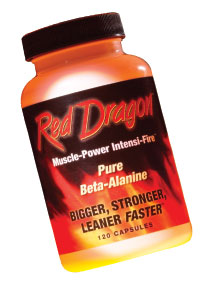 What causes muscle fatigue? One theory holds that a rise in the acid produced in muscle during exercise interferes with the normal production of energy. The body combats it by releasing natural buffers. In muscle the two primary natural buffers are phosphate and carnosine. Carnosine is a dipeptide, meaning that it’s composed of two bonded amino acids, in this case histidine and beta-alanine. Muscle contains more than enough histidine to synthesize carnosine, so the limiting factor for carnosine synthesis in muscle is beta-alanine. The body can get it from two sources: a breakdown of uracil, a primary component of RNA, in the liver; and from the degradation of carnosine itself, usually eaten in meat. That natural source is, however, limited. Many studies that I’ve discussed in past issues of IRON MAN show that taking four to six grams of supplemental beta-alanine a day increases muscle carnosine by as much as 60 percent after only 28 days of supplementation. Taking the beta-alanine for another 35 days boosts carnosine another 20 percent.
What causes muscle fatigue? One theory holds that a rise in the acid produced in muscle during exercise interferes with the normal production of energy. The body combats it by releasing natural buffers. In muscle the two primary natural buffers are phosphate and carnosine. Carnosine is a dipeptide, meaning that it’s composed of two bonded amino acids, in this case histidine and beta-alanine. Muscle contains more than enough histidine to synthesize carnosine, so the limiting factor for carnosine synthesis in muscle is beta-alanine. The body can get it from two sources: a breakdown of uracil, a primary component of RNA, in the liver; and from the degradation of carnosine itself, usually eaten in meat. That natural source is, however, limited. Many studies that I’ve discussed in past issues of IRON MAN show that taking four to six grams of supplemental beta-alanine a day increases muscle carnosine by as much as 60 percent after only 28 days of supplementation. Taking the beta-alanine for another 35 days boosts carnosine another 20 percent.
When supplied to young adults, age range 18 to 30, at a dose of 6.4 grams daily, beta-alanine increased work capacity before fatigue by 12 to 15 percent after 28 days. What about older people? Would carnosine lower muscle fatigue for them too? Many older people don’t eat a lot of the richest natural source of carnosine, red meat. In addition, enzymes rapidly degrade most of the carnosine from food—which does liberate some beta-alanine in the body. Nonetheless, one study of older people found that their type 2 muscle fibers—where carnosine concentrates, since they’re highly prone to increased acid production—contained 47 percent less carnosine than those of younger people.
Increased carnosine in older people would lower the muscle-fatigue threshold, making exercise easier and more effective. In a recent study researchers gave 800 milligrams of beta-alanine—less than that usually supplied to younger people—three times a day for 90 days to 26 men and women, aged 55 to 92. Others received a placebo. Those in the beta-alanine group were able to exercise 28.6 percent more intensely before becoming fatigued. The exercise was done on a special type of stationary cycle. Those in the placebo group showed no changes.
While athletes and bodybuilders show increased muscle carnosine from the exercise alone, the older subjects were untrained, thus pointing to beta-alanine supplementation as the source of their increased resistance to fatigue. The implications is that beta-alanine is particularly useful for older people, since it makes it easier for them to engage in exercise. Exercise, in turn, is effective in helping to maintain physical and mental health and preventing the muscle frailty that is often the harbinger of mortality.
Stout, J., et al. (2008). The effect of beta-alanine supplementation on neuromuscular fatigue in elderly (55-92 years): A double-blind study. J Int Soc Sports Nutr. 5:21.




















You must be logged in to post a comment Login